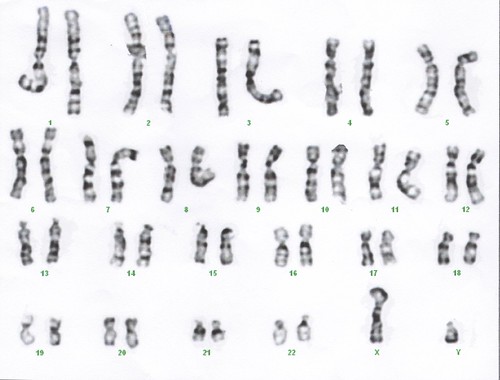
The United States Congress has once again taken up the Equality Act, which would explicitly extend civil rights protections to classes defined in terms of sexual orientation and gender identity. While there may be legitimate discourse on some of the finer points of the legislation, what troubles me most is how often an overly simplistic and reductive understanding of biology is dragged out in an attempt to refute the validity of some of these categories. My first instinct is to correct and clarify the science, but in all likelihood the science isn’t actually at the root of the issue so much as an attractive rhetorical option. So before I share some of the biological details, allow me to explore some theological thoughts towards an expansive acceptance of human diversity.
A common place to start a discussion of human identity is Genesis 1, where God’s creations include man and woman. Some broad categories are mentioned, but the passage is not a detailed enumeration of all God’s creatures. Differentiating male and female humans is the most detailed that passage gets. In Genesis 2, we read that Adam has the opportunity to name all the animals. Presumably he gets more specific than cattle and creeping things; at the same time, we don’t traditionally read this passage as meaning he gave each individual creature unique names like “Donald” or “Daisy.” I infer then that Adam had some discretion about the granularity of the categories. Such decisions could be a form of causation and thus a way for Adam to exercise his God-granted dominion over creation. And regardless of whether this is an appropriate reading of Genesis 2, we can recognize that today humans group other humans in various ways and those decisions can have profound consequences for good or ill. So to the extent we have freedom to make category decisions, we should consider which decisions will allow our fellow humans to flourish.
I think it is also reasonable to ask whether we should be so reductive extrapolating so much about people just from their chromosome allotment. Scientifically we know that genes don’t tell us everything about a person’s biology, and biology doesn’t tell us everything about their personality or demeanor. As Christians, I think we should grant at least that much transcendence of genetics to our fellow humans. Obviously the Bible doesn’t talk about genes, but there is an overarching theme that birth is not destiny. Whether it is the calling of Abraham, the relationship of Ruth and Boaz, or Paul’s writings about grafting branches, there are many examples of identity being informed by more than parentage or heritage. I don’t quite know how to square that theme with thinking that XX or XY is all that matters.

 )
)Which brings us to the reality that even biologically speaking XX or XY is not all that matters. Yes, sex chromosomes play a significant role, which is why we learn about them as an introduction somewhere in the middle grades. But the X and Y shapes do not themselves have a biological function; instead what matters is the genetic contents of those chromosomes. There are several key genes, including one known as SRY (Sex-determining Region Y) or TDF (Testis-Determining Factor). The SRY gene encodes a protein that binds to DNA and regulates the expression of other genes, ultimately leading cells to differentiate towards developing the apparatus to produce and deliver sperm as well as hormones that exert further influence on development. As the name suggests, SRY is typically found on the Y chromosome, which is why many individuals with a Y chromosome develop that way. However, through recombination, the SRY gene can wind up on an X chromosome, leading to someone with two X chromosomes and also genes involved in sperm development.
Such recombination events are just one source of broader human diversity. There are variations in some of the genes regulated by SRY that can have an impact on development. Throughout life, hormones like cortisol and testosterone impact development, biological activity, and behavior in ways related to sex and gender. For both genetic and non-genetic reasons, humans can vary both in how much of these hormones they produce and in how their cells respond to those hormones. It is even possible for fraternal twin embryos with differing sex chromosomes to fuse and develop as a single chimeric individual. And so on. The end result is a more diverse set of phenotypes and expressions than can be determined by a single binary.
Not all of this biological diversity is connected to identifying as transgender, transsexual, nonbinary or any other single category. Some of these individuals may be intersex or cis-gendered. The point is merely that inquiring about someone’s chromosomes doesn’t even tell you everything about their biology even just as it pertains to sex. And yes, many of these scenarios are rare. But that doesn’t mean we can ignore or dismiss them. As I understand it, that’s a main reason to identified protected classes of people, so that less frequent needs are also taken into account. I am not a clinician, so I do not know the best way to meet those needs with respect to various medical, surgical or psychiatric options. I just don’t want to see people treated reductively instead of with dignity and compassion based on limited understanding of biology.
Andy has worn many hats in his life. He knows this is a dreadfully clichéd notion, but since it is also literally true he uses it anyway. Among his current metaphorical hats: husband of one wife, father of two teenagers, reader of science fiction and science fact, enthusiast of contemporary symphonic music, and chief science officer. Previous metaphorical hats include: comp bio postdoc, molecular biology grad student, InterVarsity chapter president (that one came with a literal hat), music store clerk, house painter, and mosquito trapper. Among his more unique literal hats: British bobby, captain’s hats (of varying levels of authenticity) of several specific vessels, a deerstalker from 221B Baker St, and a railroad engineer’s cap. His monthly Science in Review is drawn from his weekly Science Corner posts — Wednesdays, 8am (Eastern) on the Emerging Scholars Network Blog. His book Faith across the Multiverse is available from Hendrickson.

Leave a Reply